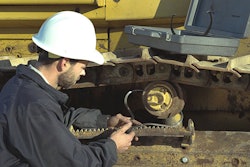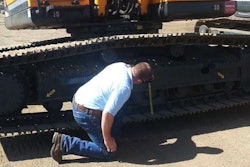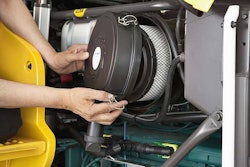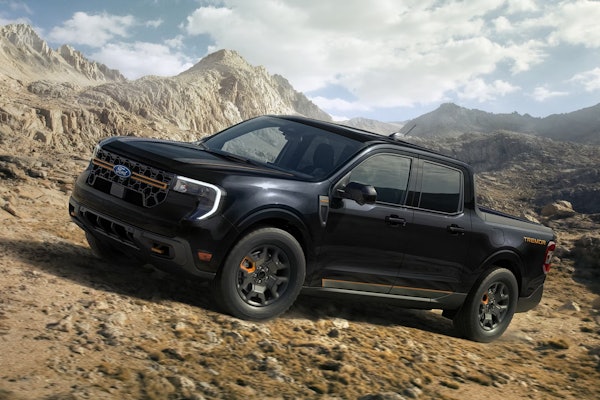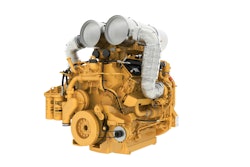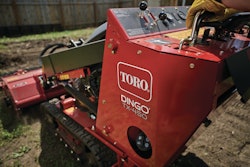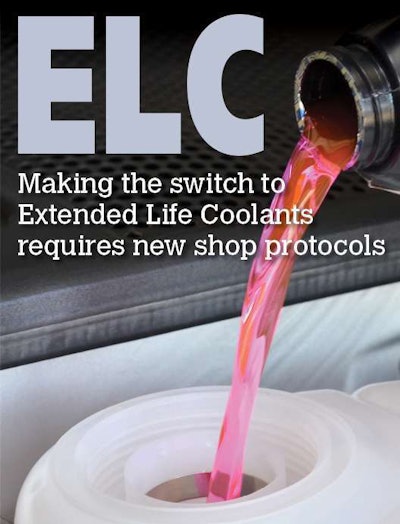
When it comes to extended life coolants (ELCs), the news is all good. They’re more expensive than conventional coolants, but last for 500,000 miles or better in trucks and 6,000 hours or more in off-road equipment. And ELCs don’t plate out a mineral coating on the inside of your cooling system, so the heat exchange process is more efficient and water pump wear is greatly reduced.
ELCs are also backward compatible to any age or vintage of truck or equipment, and they deliver exceptionally good returns on investment in trucks or equipment that operate in severe conditions, high dust areas or have high idle time, says Jeff Snyder, industrial brand specialist, Chevron Products.
“With conventional coolants, the system was checked at every service interval,” says Snyder. “A lot of times with extended life coolants they fail to do that because they see that word ‘extended’ in there.”
The lesson here is you don’t have to change ELCs nearly as often, but you should keep an eye on your cooling systems regardless of what type of coolant you use, for reasons unrelated to the coolant itself.
But remember, some people can screw up an anvil.
The best coolant in the world won’t save you any money if you neglect your cooling system or don’t follow the manufacturer’s recommended procedures. So make sure everybody in your shop and your drivers and operators and the people in your supply and inventory positions know what’s going on and why. Here are the steps you need to take to ensure success:
Consider switching all your trucks and equipment to ELCs.
The new ELCs have become the factory fill for many equipment and truck OEMs. If you have new equipment or trucks with ELCs but you’re still using conventional coolants in older equipment and trucks, consider upgrading the older engines to ELCs at the next change interval. The reason for this is simple – inventory management. If you have only one coolant in your equipment and inventory, you reduce to zero the chance that somebody will use the wrong coolant.
ELCs are compatible with conventional coolants up to a point. An 80/20 mix of ELC and conventional coolant will still give you all the benefits and protection ELCs offer. But if get much more than 20 percent dilution with conventional coolant you start to lose the effectiveness of the ELC. If somebody in the shop or in the field repeatedly tops off with the wrong coolant you could be putting your engines at risk.
Stede Granger, OEM technical services manager for Shell, says he’s worked with fleets that tried to manage two types of coolants in the past, but ended up switching to one. “Some of the shops in this company ran 24 hours a day and if they ran out of one type of coolant, they’d substitute another. It just became better to have one coolant. It saved them quite a bit of money and their maintenance costs now are lower than they’ve ever been.”
Flush-and-fill is the best way to convert.
If you follow your engine or equipment OEMs guidelines for cooling system flush-and-fill, you’ll remove all but a tiny percentage of the old coolant and maximize the percentage of ELC on the fill step. If for whatever reason you can only do a drain-and-fill, in most cases that will get you to within that 80/20 ratio. But flush-and-fill is the preferred method.
“A flush-and-fill has to be done in a careful manner,” says Colin Dilley, director of technology, Prestone Technology Center. “You have to make sure you drain everything. Once you’ve flushed it, the filling up is critical. You want to make sure you don’t get any air pockets in the system.”
Dilley recommends you find out what the OEM says is the volume of the cooling system, add half that volume of coolant and half water. (Or adjust up to whatever your freeze point protection requires if you’re working in cold climates.)
Conversions
Some coolant providers also offer what they call a conversion fluid. This is a package of ELC additives that can be put on top of a system that has conventional coolant already in it. You simply drain out 10 to 12 percent or so of the conventional coolant and put in the concentrated additives to fill the system back up.
The benefit of a conversion fluid is that you don’t have to spend the time to completely drain your cooling system and dispose of the old coolant. The only drawback is that it takes a bit longer for the full benefits of the ELC additives to take effect, says Snyder.
If this is something you’re considering, consult with your coolant supplier.
Use good water
When mixing ELC concentrate or topping up, it is important to use de-ionized or de-mineralized water. Water with chlorides or salts can lead to mineral scale formations inside your radiators, robbing you of one of the key benefits of ELC. “You have a big investment in your coolant and you don’t want to mess that up,” says Dilley. And don’t assume tap water is OK. It sometimes is not. Test your water before you mix in your ELC concentrate and add it to your cooling system.
Double check your coolant filters
The additives in conventional coolants deplete over time. Some manufacturers remedy this with coolant filters that contain a solid plug of additives that dissolve into the fluid to maintain the proper additive balance.
Since ELC additives do not deplete over time, no such additive recharge via the coolant filter is needed. But if you use one of these recharging filters on a truck or piece of equipment that has been converted to ELC, those additives in the filter will negate the effectiveness of the long-life ELC additives and may push you over that 80/20 ratio deemed necessary for the effectiveness of ELCs. So change the filters when you change coolants and get rid of any of the old recharge-type filters in your inventory.
Maintain service intervals
As the name implies extended life coolant will last many times longer than conventional coolants. But that doesn’t mean fill and forget.
“The basic requirement is to do two refractometer readings a year to verify the freeze point, typically in the spring and fall,” says Snyder. “If the freeze point is correct, then the likelihood is that you have the proper additive levels.” Snyder also recommends sending a coolant sample to the lab once a year or using a field test kit.
“Technicians should also be looking for color changes, odors, and particulate or oil in the coolant, just as they would for conventional coolant,” Snyder says. “It only takes about 30 seconds to go through the whole process and it can help prevent costly maintenance errors in the future.”
Drivers and operators should, same as before, check coolant levels every day and look for evidence of leaks or worn hoses.
Some coolant providers also recommended putting in additive extenders at a certain number of miles or hours – typically at the half way point in the ELCs life. So be sure to follow their recommendations and plug the numbers into your maintenance programs so you don’t forget.
Top up like with like
Even the best cooling systems will lose some of their coolant volume over time. This means periodic top ups. Make sure your technicians, operators and drivers know to top up with the right product. If they top up with conventional coolant you lose some of the benefits of the ELC and if they continue to top up with the wrong product, concentrate only or water, only they will compromise the effectiveness of the cooling system and may cause damage.
Most coolant manufacturers offer a premixed 50/50 ELC that you can add directly to your radiator without having to mix it yourself. These are ideal for periodic top ups. “Some fleets only want to pay for concentrate, because they don’t want to pay for the water,” says Granger. “But then their guys get in a hurry and dump pure concentrate into the truck.” That leads to concentrations as high as 80 or 90 percent, which won’t perform as well as 50 percent, especially in hot conditions.
“The freeze point protection doesn’t keep getting better the more ethylene glycol you add,” says Dilley. “You can get slushing of the coolant where it becomes thick and hard to pump around the system. That leads to poor heat transfer and overheating of the engine. You can also get water pump leakage and coolant system component failure. The whole system is under stress.”
Communicate, communicate, communicate
When doing something as big as a wholesale change in the coolants you use, it’s extremely important to communicate what you’re doing and why to everybody: mechanics, technicians, service truck personnel, operators and drivers and the parts and inventory department. Have a meeting to inform everybody, change all your labels, adjust inventory and if necessary print out reminders to put in the cabs of your trucks and equipment.
“Transparency and communication are critical to any change,” says Snyder. “You have to be sure everybody is fully aware of what that change is, even if it is a small change.”




